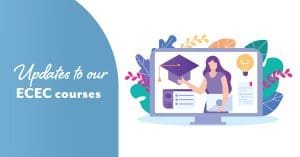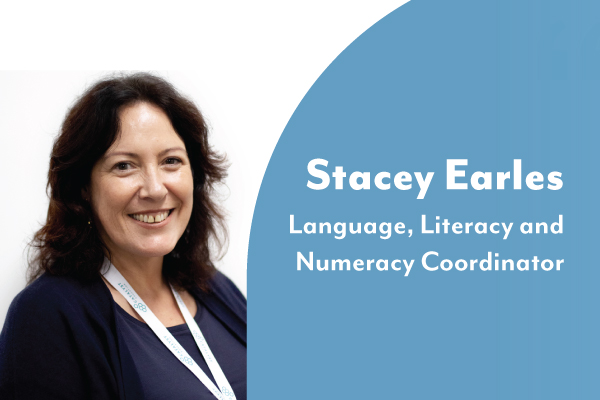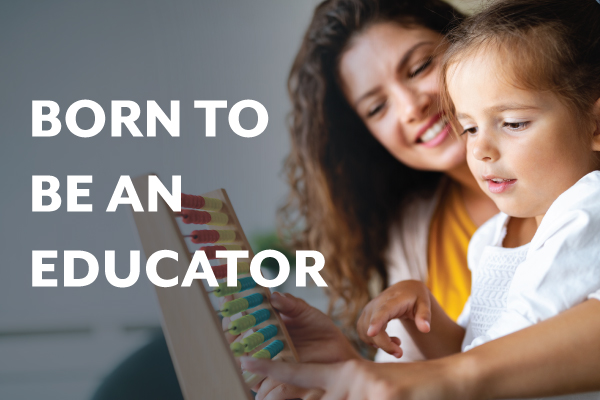As we enter the New Year, you might notice a few changes to early childhood education and care courses. This new early childhood education training package has been carefully designed to ensure maximum contribution to a thriving early childhood education sector, now and well into the future.
The first thing that is noticeable is that the course codes have changed. This is a reflection of the updates and changes that have been applied to the CHC30121 Certificate III in Early Childhood Education and Care, as well as the CHC50121 Diploma of Early Childhood Education and Care.
In 2021, it became mandatory across the sector for educators to take on the Certificate III in Early Childhood Education and Care as an entry-level qualification to work in early childhood education and to progress to the CHC50121 Diploma of Early Childhood Education and Care. The changes to these two courses acknowledge that these qualifications are vital to shape and support the highest quality educators possible.
We are committed to helping provide a highly skilled workforce to meet the demands of the sector. In turn, these educators can go on to provide children with everything they need to get the very best start in their education and life.

Changes to early childhood education qualifications
The updates to our courses were developed in consultation with sector experts, learners are guided through current and future-trending, workplace-based best practice in every module.
The goal has been to ensure that the early childhood education training package course material adequately meets the current skills needs of the sector. Our learners are equipped to be professionals at the forefront of positive change for the sector, by actively engaging in research and evidence-based trends driving effective outcomes in early childhood education and opening up collaborative dialogues with other sector professionals throughout their course. In addition, every module is delivered with extended learning materials and practical skills training, which provides deeper understanding to develop confidence and habits of best practice.
Throughout the course, learners are guided in how to apply adaptive (soft) skills to develop a culture of care and compassion. Adaptive skills include:
- Interpersonal communication
- Emotional intelligence
- Team building/teamwork
- Leadership
- Compassion, empathy
- Critical reflection/self-reflection
- Problem solving
- Adaptability
These adaptive skills in action could be knowing how to ask questions to help others feel safe and connected, how to actively listen and seek proactive feedback, and to support others to do the same.
Embedded throughout our courses is theory work that teaches emotional intelligence and self-awareness to be adaptable in their personal, pedagogical practice. Learners are positioned to expand their critical thinking and strengthen their reflection and problem-solving skills in all of their assessments. In their tasks they are required to actively listen and develop their solution-building skills to ask questions that enhance their learning and comprehension of job responsibilities. Questions learners are encouraged to consider include: “How am I going?”, “What are my strengths?”, and “What do I want to achieve?”.
Learners are positioned to expand their critical thinking and strengthen their reflection and problem-solving skills in all of their assessments. In their tasks they are required to actively listen and develop their solution-building skills to ask questions that enhance their learning and comprehension of job responsibilities.
In addition to dedicated trainer support, our unique Learner Success team provides further wrap around support to learners. Our cohorts are enrolled into learner Community Hubs with learners at the same stage of their qualification. This provides a great platform to connect and learn with peers and future leaders in the sector.
To provide a more engaging and personable learning experience, we have incorporated story-based learning and avatar characters into our theory coursework. Learners will get to know characters such as children Sasha and Jaycie and centre manager Carol throughout their learning journey. The storylines use real-life examples provided from members working within the sector.
An increased exploration of First Nations peoples and cultures has also been incorporated into courses, continuing our dedication to inclusion, diversity and a well-rounded education for all.
For those moving into undertaking their Diploma level qualification, Diploma electives have been chosen to support innovation, research-based evidence skills to support future and emerging trends in the sector. With the Certificate III now a pre-requisite, there will be a higher level of expectation in terms of foundation knowledge. Further, the Diploma is focused on supporting candidates in their leadership skills and ability to coach and mentor in the different areas of competency.
Future early childhood educators to benefit from course updates
This updated training package for early childhood education learners offers many benefits to future educators.
Our focus on in-depth learning and self-reflection will support learners to develop their mindset and outlook while also raising their professionalism and capabilities. We strive to set up our learners as change-makers who question current practices and continually find more effective solutions to create the most effective early learning environments and approaches ongoing. The changes to our early childhood education courses will support learners to become more flexible, self-aware, solution-focused, and resilient educators. They will be able to become leaders in the sector and support children to receive the best start.
With our new, updated approach, future educators will experience benefits including:
- Improved adaptive skills and emotional intelligence
- Increased confidence in the workplace
- Self-belief in their ability to make a difference
- Enhanced critical thinking skills
- Stronger problem-solving abilities
A bright future for early childhood education
We are excited for this new chapter for our early childhood education and care courses. The sector needs kind, caring and committed individuals to join the sector, undertaking quality qualifications to deliver the best possible early learning experience for children.
Together with learners we look forward to contributing to a bright future for the early childhood education sector and for maximising outcomes for children.
For more information about our courses or to learn how you can make a genuine difference for children’s lives, reach out to our team.



